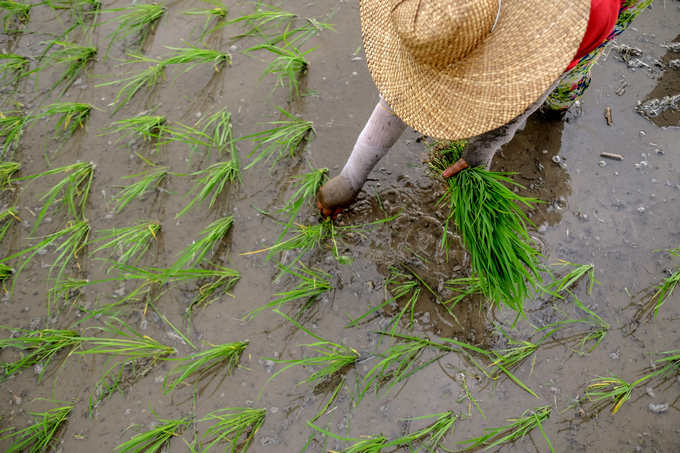November 28, 2025 | 04:14 GMT +7
November 28, 2025 | 04:14 GMT +7
Hotline: 0913.378.918
November 28, 2025 | 04:14 GMT +7
Hotline: 0913.378.918

Planting rice in the Philippines.
The measure of changes in world food commodity prices remained largely steady in November, with declining international prices of cereals, meat and dairy products offsetting increasing quotations for vegetable oils and sugar, the Food and Agriculture Organization of the United Nations (FAO) reported Friday.
The FAO Food Price Index, which tracks monthly changes in the international prices of a basket of commonly-traded food commodities, averaged 135.7 points during the month of November, a fraction below its level in October. The Index is now only 0.3 percent higher than its level in November 2021.
The FAO Cereal Price Index declined by 1.3 percent from the previous month, but it was still up 6.3 percent from its value a year ago. World wheat and maize prices declined in November by 2.8 percent and 1.7 percent, respectively, partly influenced by the extension of the Black Sea Grain Initiative. By contrast, international rice prices moved up by 2.3 percent.
The FAO Vegetable Oil Price Index increased by 2.3 percent in November, ending seven consecutive months of decline. International palm and soy oil prices rose, while those of rapeseed and sunflower oils dropped.
The FAO Dairy Price Index decreased by 1.2 percent since October, with world quotations for butter, skim and whole milk powders falling, amid lower import demand, while those for cheese increased, in part due to less buoyant export availabilities from leading producing countries in Western Europe.
The FAO Meat Price Index was 0.9 percent lower in November than the previous month, as international bovine meat prices fell, as increased export supplies from Australia added to already-high supplies from Brazil, notwithstanding China’s continuing strong import demand. By contrast, world prices of all other meat types rebounded, led by higher quotations for ovine meat.
The FAO Sugar Price Index rose 5.2 percent in November, influenced by strong buying amid tight global sugar supplies due to harvest delays in key producing countries and the announcement by India of a lower sugar export quota. Higher ethanol prices in Brazil also exerted upward pressure on world sugar prices.
More details are available here. To access benchmark export quotations of various foodstuffs and national retail/wholesale prices of foods please visit FAO’s Food Price Monitoring and Analysis (FPMA) Tool
2022 world cereal output forecast is lowered
In the latest Cereal Supply and Demand Brief, also released today, FAO further cut its forecast for world cereal production in 2022, which now stands at 2 756 million tonnes, a 2.0 percent drop from 2021.
The reduction largely reflects low maize production prospects in Ukraine, where the impact of the war has made post-harvesting operations prohibitively expensive. FAO also lowered its global wheat production forecast for the year, but despite this cut, the new 781.2 million tonne figure would remain a record high. Global rice production is expected to fall by 2.4 percent below the previous year’s all-time high.
Looking ahead, planting of the 2023 winter wheat crop is underway amid concerns over the affordability of key agricultural inputs and adverse weather conditions in the United States of America and the Russian Federation, although elevated crop prices could help to maintain an above-average area globally. In the southern hemisphere, coarse grain crops are being sown, and official forecasts in Brazil point to a record high area being sown to maize.
Further details and updated forecasts for worldwide utilization of cereals in the 2022/23 season, for world cereal stocks by the close of seasons in 2023 and for world trade in cereals are available here.
45 countries need external assistance for food
45 countries around the world, including 33 in Africa, nine in Asia, two in Latin America and the Caribbean and one in Europe, are assessed to be in need of external assistance for food due to conflicts, extreme weather events and soaring inflation rates, according to the latest Crop Prospects and Food Situation report, a quarterly publication by FAO’s Global Information and Early Warning System (GIEWS).
Food insecurity conditions in countries in East Africa and West Africa are of particular concern.
For low-income food-deficit countries, the 2022 cereal output is forecast at 184.5 million tonnes, on par with the past five-year average, while the total cereal import requirement is forecast at 63.7 million tonnes, up 7 percent from the last five-year average.
(FAO.org)

(VAN) A new study reveals how the simultaneous effects of ocean acidification, salinity and loss of oxygen are making the world more fragile.

(VAN) Hopes are growing that the creation of the first 3D turkey gut model could be a turning point in the battle against the virulent blackhead disease.

(VAN) Tyson, America’s biggest meat supplier, plans to shutter one of its largest beef processing plants as the industry continues to struggle with low cattle supplies and political pressure from Washington.

(VAN) New FAO study shows how digital solutions are empowering farmers and fishers to prevent losses and build resilient agrifood systems.

(VAN) Brazil's COP30 presidency pushed through a compromise climate deal on Saturday that would boost finance for poor nations coping with global warming but that omitted any mention of the fossil fuels driving it.

(VAN) Poultry farmers in the UK have been warned that they could face one of the worst winters yet for bird flu.

(VAN) Prices of main-crop paddy have risen sharply, with jasmine rice hitting 16,100 baht per tonne — the highest level in years.